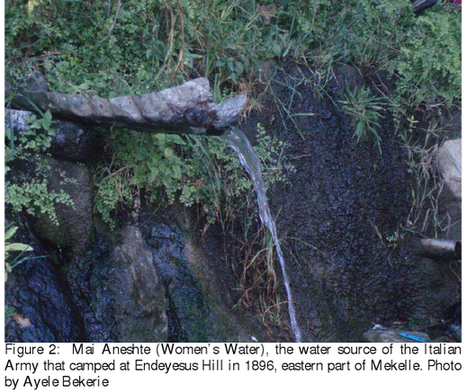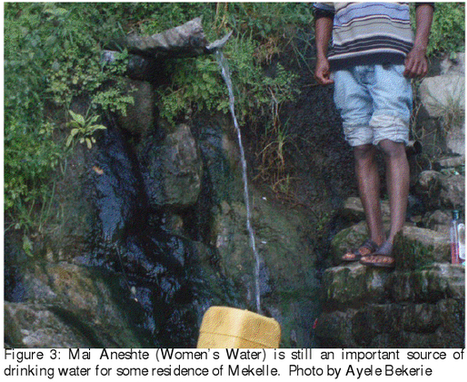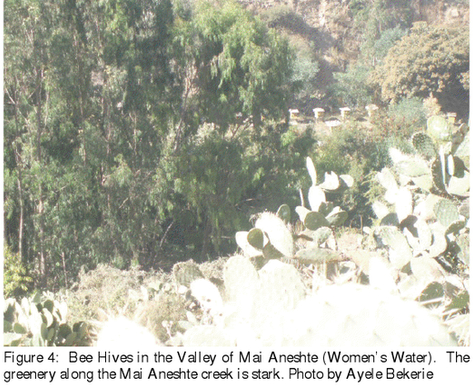Opinion/History
Adwa Rhymes with Pan-Africanism and Addistu Ethiopia
By Ayele Bekerie, PhD

Published: Tuesday, March 1, 2011
Mekelle, Ethiopia – As much as ancient Ethiopia inspired the development of Pan-Africanist movements and organizations throughout the African world, contemporary Ethiopia’s history has also its symbolic significance with respect to the establishment of the African Union. Pan-Africanism refers to intellectual movements dedicated to a complete liberation of the people of Africa and the African Diaspora from all forms of colonialism. They have been movements of self-definition, political and cultural emancipations. I am arguing that the movements, in part, were inspired by the historic and permanent victory at the Battle of Adwa one hundred and fifteen years ago.
Ethiopia was brought to the African world’s attention in 1896 when Ethiopia, an African country, defeated Italy, a European country, at the battle of Adwa. According to Donald Levine, “the Battle of Adwa qualifies as a historic event which represented the first time since the beginning of European imperial expansion that a non-white nation had defeated a European power.”
It was a victory of an African army in the true sense of the word. The Battle was planned and executed by African generals and spies led by Emperor Menelik II, who was born, brought up, and educated in Ethiopia. It was a brilliant and indigenous strategy that put a check to the colonial aims and objectives, which were originally conceived and agreed upon at the Berlin Conference of 1885. European strategy to carve Africa into external and exclusive spheres of influence was halted by Emperor Menelik II and Empress Taitu Betul at the Battle of Adwa. The Europeans had no choice but to recognize this African (not European) power.
The African World celebrated and embraced this historic victory. In the preface to the book An Introduction to African Civilizations With Main Currents in Ethiopian History, Huggins and Jackson write: “In Ethiopia, the military genius of Menelik II was in the best tradition of Piankhi, the great ruler of ancient Egypt and Nubia or ancient Ethiopia, who drove out the Italians in 1896 and maintained the liberties of that ancient free empire of Black men.” Huggins and Jackson analyzed the victory not only in terms of its significance to the postcolonial African world, but also in terms of its linkage to the tradition of ancient African glories and victories.
Emperor Menelik II used his “magic wand” to draw all, the diverse and voluntary patriots from virtually the entire parts of the country, into a battlefield called Adwa. And in less than six hours, the enemy is decisively defeated. The overconfident and never to be defeated European army fell under the great military strategy of an African army. The strategy was what the Ethiopians call afena, an Ethiopian version of blitzkrieg that encircles the enemy and cuts its head. Italians failed to match the British and the French in establishing a colonial empire in Africa. In fact, by their humiliating defeat, the Italians made the British and the French colonizers jittery. The colonial subjects became reenergized to resist the colonial empire builders.
Adwa irreversibly broadened the true boundaries of Ethiopia and Ethiopians. People of the south and the north and the east and the west fought and defeated the Italian army. In the process, a new Ethiopia is born.
Adwa shows what can be achieved when united forces work for a common goal. Adwa brought the best out of so many forces that were accustomed to waging battles against each other. Forces of destruction and division ceased their endless squabbles and redirect their united campaign against the common enemy. They chose to redefine themselves as one and unequivocally expressed their rejection of colonialism. They came together in search of freedom or the preservation and expansion of the freedom at hand.
Emperor Menelik II could have kept the momentum by reforming his government and by allowing the many forces to continue participating in the making of a modern and good for all state. Emperor Menelik II, however, chose to return back to the status quo, a status of exploitative relationship between the few who controlled the land and the vast majority of the agrarian farmers. It took another almost eighty years to dismantle the yoke of feudalism from the backs of the vast majority of the Ethiopian farmers.
As long as Emperor Menelik’s challenge to and reversal of colonialism in Ethiopia is concerned, his accomplishment was historic and an indisputable fact. It is precisely this brilliant and decisive victory against the European colonial army that has inspired the colonized and the oppressed through out the world to forge ahead and fight against their colonial masters.
Menelik’s rapprochement, on the other hand, with the three colonial powers in the region may have saved his monarchial power, but the policy ended up hurting the whole region. The seeds of division sown by the colonizers, in part, continue to wreck the region apart.
Realizing the need to completely remove all the colonizers as an effective and lasting way to bring peace and prosperity in the region, the grandson of the Emperor, Lij Iyassu attempted to carve anti-colonial policy. He began to send arms to freedom fighters in Eritrea, Djibouti, and Somalia. He entered into a treaty of peace and cooperation with the Austrians, the Germans and the Turks against the British, Italians and the French. Unfortunately, the rule of Lij Iyassu was short-lived. The tri-partite powers colluded with the then Tafari Makonnen to successfully remove him from power.
Adwa symbolizes the aspirations and hopes of all oppressed people. Adwa catapulted Pan-Africanism into the realm of the possible by reigniting the imaginations of Africans in their quest for freedom throughout the world. Adwa foreshadowed the outcome of the anti-colonial struggle in Africa and elsewhere. Adwa is about cultural resistance; it is about reaffirmation of African ways. Adwa was possible not simply because of brilliant and courageous leadership, but also because of the people’s willingness to defend their motherland, regardless of ethnic, linguistic and religious differences.
Adwa was a story of common purpose and common destiny. The principles established on the battlefield of Adwa must be understood and embraced for Africa to remain centered in its own histories, cultures and socioeconomic development. We should always remember that Adwa was won for Africans. Adwa indeed is an African model of victory and resistance.
—
Publisher’s Note:
This piece is well-referenced and those who seek the references should contact Professor Ayele Bekerie directly at: abekerie@gmail.com.
About the Author:
Ayele Bekerie is an Associate Professor at the Department of History and Cultural Studies at Mekelle University. He was an Assistant Professor at the Africana Studies and Research Center at Cornell University. Bekerie is a contributing author in the highly acclaimed book, “One House: The Battle of Adwa 1896 -100 Years.” He is also the author of the award-winning book “Ethiopic, An African Writing System: Its History and Principles” — among many other published works.



Thanks for this inspiring article. I happen to be in this place, specially Mai Aneshte. I was gone to deep memory of my stay in Mekelle. Great thanks for Dr. Ayele and tadias.com
Thanks Dr. Ayele. We need hebret today more than ever so thank you. I have one question though, why did Menelik decide not to pursue the Italians into Eritrea and beyond? Notwithstanding his brilliant military strategy (helped also by Eritrean spies), the fact that he left our brothers in the North under the yoke of colonialism is one of Menelik’s sad legacies. Haile Gerima mentions this point in his movie Adwa. I am really curious why?
Wonderful article Dr. Bekerie! Thank you for preserving this very important history.
Best,
Ira
To Dire Biaber,
The simple answerer to your question regarding why Menelik decided not to pursue the Italians into Eretria is “brilliant”.
1. You have to look at the time during which the war was conducted, there was severe drought throughout Ethiopia, and starvation was looming over a most of the Northern part of the country.
2. The army must have been too exhausted after the battle and long journey from the central highlands.
3. In addition to that you have to make a political decision not to push your luck, understand what you have achieved and wait for the right time to make your next move.
4. As you maybe aware the Italians were well established in Eretria and preparing to sending reinforcement from Eretria and even from Italy to help the defeated army so taking all that in to account and lack any popular movement within Eretria against Italians Minelike made the right decision not to go further with the war.
Take care
Thanks Professor Ayele Bekerie. This is realy Wonderful article. It has tremendous importance for Africa. Anyways writing on this historic victory is blessing.
Dear Dir Biabir,
The issue of pursuing the Italians into Eritrea and beyond is a complex historical issue. It is true that the decision is a sad legacy, but we have to weigh in all the factors that led to the decision. Lij Iyasu understood the unfinished issue by carving out a policy to drive out all the three colonial powers (Italy, France, and Britain) from the greater Horn of Africa. This is hinted in the following paragraph:
Realizing the need to completely remove all the colonizers as an effective and lasting way to bring peace and prosperity in the region, the grandson of the Emperor, Lij Iyassu attempted to carve anti-colonial policy. He began to send arms to freedom fighters in Eritrea, Djibouti, and Somalia. He entered into a treaty of peace and cooperation with the Austrians, the Germans and the Turks against the British, Italians and the French. Unfortunately, the rule of Lij Iyassu was short-lived. The tri-partite powers colluded with the then Tafari Makonnen to successfully remove him from power.
It is also important to note that the logistics (Yesinq gudai) problem would have been too immense. The enemy would have had a chance to regroup and confront the Ethiopian army again and again. After all, it did exactly that in 1935 and occupied almost the whole region for five years!
The positive feedback of Ira Revels and Z is appreciated.
The victory at Adwa was so huge that cries of Viva Menelik was common among anti-colonial movements around the world. Not to mention that the Prime Minister of Italy was sucked as a result of this defeat. Read the New York Times’ account of the encounter published on March 3, 1896.
The New York Times
Published March 3, 1896
ITALY’S TERRIBLE DEFEAT
Three thousand Men Killed, Sixty Guns and All Provisions Lost.
Baratieri’s Strategy Condemned.
All Available Steamers for Transport of Reinforcements to Abyssinia are Ordered.
Persistent Rumor of Ministry’s Fall
Rome, March 3 – The present campaign against the Abyssinians threatens to become one of the most disastrous in which the Italians arms have ever taken part, and what the final outcome will be it would be hard to predict. It was rumored today that the latest defeat of the Italians by King Menelik had compelled Ministry to resign, owing to the popular disapproval of the Government’s policy, but tonight this report is denied.
Details received here today of the defeat on Sunday of the Italian Army show that the Italian losses were very heavy, they being placed by some at 3,000 killed. It is still impossible to ascertain the precise losses, but popular opinion credits the report that the number of killed is not overstated. Thus far the reports make no mention of the number of wounded. Among the dead are Gen. Albertone, Commander of the Left Brigade, and Gen. Dabormida, Commander of the Right Brigade.
The news of this latest disaster has caused the greatest excitement throughout Italy, and the Opposition party is taking advantage of it to make violent attacks upon the Government’s policy in attempting to extend the sphere of Italian influence in Abyssinia.
The Pope is greatly disturbed by the news.
Among the many reports current today was one to the effect that Gen. Baratieri had committed suicide, being unable to endure the humuliation of his defeat.
Ethiopians of all walks of life paid the price of freedom at Adwa in 1896. Their sacrifice ensured our independence. We walk tall with our heads held high in to the clouds anywhere on this planet because our forefathers chose to die fighting for freedom. They won against all odds. The price of freedom was the enormous loss of life. What can I say? Not much really. But you can not imagine the pride welling up in me ready to burst through my cranky chest! Thanks Adwa!
I am very happy to see the great history of my birth-town ADWA!!!!Thank you.
Well said Hobishan K!!!
It is because of Adwa and our great grandparents, who paid the ultimate price, we, their descendents, walk tall with our heads held high in to the clouds, sometimes being the only shade of color in the room in corporate America. May yehagere arba arat tabotoch yitebiquatchew!!!!
It is blessing to be part of this history thanks for the extract and it is our pride that our forefathers managed to fight for freedom. The battle of Adwa is a pride of Africans. We have seen many military Generals like Ras Alula Abanega who fiercely fought and effectively spied the Italians through their agents. Proud to be Ethiopian.
I few questions 1. Was there a proof as whether Menilik was in side with Atse Yohannes when Gondar and Gojam were invaded by the Mahadists?
2. Is it true that Menelik was to get back home after waiting for few days in Adwa becasue the italians didn’t move from their military base?
Take care